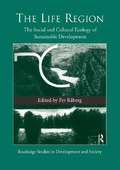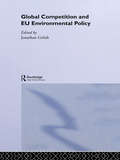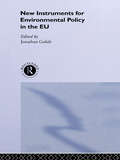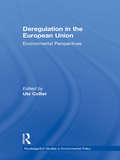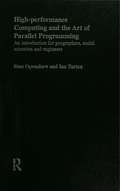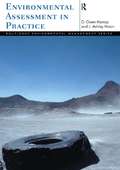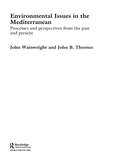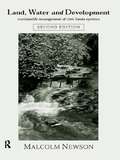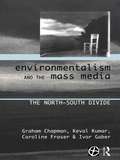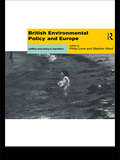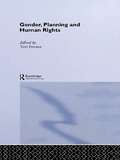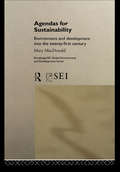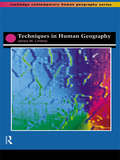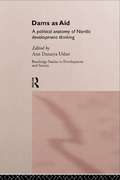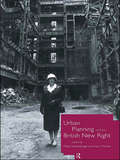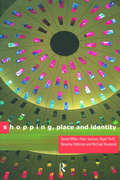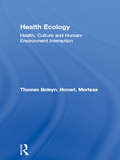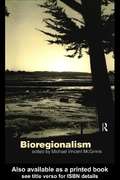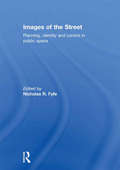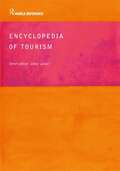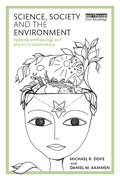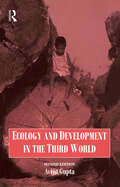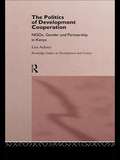- Table View
- List View
The Life Region: The Social and Cultural Ecology of Sustainable Development (Routledge Studies in Development and Society #10)
by Per RåbergThis book launches a strategy for sustainable development, starting from a socio-ecological position and developing a model for a socially and culturally supportive community, or 'Life Region'. Special emphasis is placed on the situation of the provincial and peripheral regions of Europe and the world, and the introduction of self-reliant civic strategies in national and international politics.
Global Competition and EU Environmental Policy (Routledge/eui Studies In Environmental Policy Ser.)
by Jonathan GolubGlobal Competition and EU Environmental Policy is the first book to examine the relationship between economic competitiveness and environmental protection in European Union policy.A wide range of international case studies addresses key agreements and policies, including those dealing with ozone layer protection, pesticide exports, shipping climate
New Instruments for Environmental Policy in the EU (Routledge/eui Studies In Environmental Policy Ser.)
by Jonathan GolubNew Instruments for Environmental Policy in the EU provides a comprehensive analysis of the debate over new forms of environmental regulation in the European Union.The conclusions draw attention to critical aspects of instrument design, as well as the difficulty of accommodating national policy diversity without contravening EU and international tr
Deregulation in the European Union: Environmental Perspectives (Routledge/eui Studies In Environmental Policy Ser.)
by Ute CollierExamines the environmental implication of economic deregulation through case studies of the energy, transport and water sectors. The book deals with options for deregulation, looking at self-regulation, negotiated agreements and environmental management systems. Presenting evidence from a number of EU member states and Hungary, a likely contender f
High Performance Computing and the Art of Parallel Programming: An Introduction for Geographers, Social Scientists and Engineers
by Stan Openshaw Ian TurtonThis book provides a non-technical introduction to High Performance Computing applications together with advice about how beginners can start to write parallel programs. The authors show what HPC can offer geographers and social scientists and how it can be used in GIS. They provide examples of where it has already been used and suggestions for other areas of application in geography and the social sciences. Case studies drawn from geography explain the key principles and help to understand the logic and thought processes that lie behind the parallel programming.
Environmental Assessment in Practice (Routledge Environmental Management)
by Owen Harrop Ashley NixonThis text explains what constitutes good practice in applying environmental assessment as an environmental management tool. A wide range of case studies and other student text features are employed to demonstrate how the different methods, techniques and disciplines of environmental assessment can be used. The authors address the key concepts for environmental assessment procedures: methods for using E.A.; techniques for impact prediction and evaluation; environmental risk assessment; EA consultation and participation; project management; environmental statement review and post-project analysis; and strategic environmental assessment.Worldwide case studies include: gas pipelines, hydroelectric power plants, gold mining, river crossings, waste-to-energy plants and gravel extraction in England, Scotland, Ireland, Canada, the USA, Venezuela, the Netherlands, Iceland, Zambia, Zimbabwe, South Africa and Ghana.
Environmental Issues in the Mediterranean: Processes and Perspectives from the Past and Present (Routledge Studies in Physical Geography and Environment #Vol. 1)
by John Wainwright John B. ThornesThe Mediterranean has been subject to changing human settlement and land use patterns for millennia, and has a history of human exploitation in an inherently unstable landscape. Environmental Issues in the Mediterranean reviews both physical and social aspects of this region, in relation to its environment.Ideal for students who are studying a range of environmental issues, but want to see them linked within one regional context. The book begins with an introduction to the Mediterranean region, its history, physical and human geography and its environmental problems. It then goes on to examine:* The Dynamic Environment - climate variables and fluctuations, vegetation, the hydrological cycle of the basin and its watershed, processes of erosion, fire and the Mediterranean Sea*The Human Impact on the Environment - prehistoric and historic land use, traditional agriculture, rural and urban settlement and use of mineral resources* The Mediterranean Environment Under Increasing Pressure - the present human landscape, changes in agriculture in the 20th century, the impact of depopulation, pollution, water resources, desertification and potential climatic change.It then concludes with a discussion of the region's on-going environmental issues of water resources, land degradation, agricultural intensification and tourism, and considers how these can be approached using management techniques and national and regional policies.
Land, Water and Development: Sustainable Management of River Basin Systems
by Malcolm NewsonThis is a fully revised and expanded second edition of Malcolm Newson's acclaimed book. Exploring in greater depth the meaning of sustainability in river basin development this new edition:* highlights the rapid evolution of practical concepts since the Rio Earth Summit* features new illustrations and case studies from Australia, South Africa and Israel* makes the ecosystem model more explicit throughout* strengthens coverage of the linkages between land and water management.
Environmentalism and the Mass Media: The North/South Divide (Global Environmental Change Ser.)
by Caroline Fraser Ivor Gaber Graham Chapman Keval KumarThe mass media in different countries reflects dominant concerns of contemporary societies. Ideas of `environmentalism' are often broad and imprecise, holding neither meaning nor currency. Environmentalism and Mass Media sheds new light on the diverse ideas of `environmentalism', the way environmental ideas circulate, and public reaction to environmental concerns conveyed by the media. Drawing on unique interviews with journalists, media pictures, and public opinion surveys in both UK and India, the authors outline the differing cultural, religious and political contexts against which `world views' form present a fascinating picture between North and South. Mass media and communication technology is in danger of locking Northern countries into a ghetto of environmental self-deception, thereby perpetuating poverty in the South. The South's goal remains the attainment of development; the North sees `environmental' problems occuring `elsewhere' - in Eastern Europe and developing countries. Whether or not `environmentalism' becomes a universal cause depends on how and to what extent such sharply contrasting world views can converge.
British Environmental Policy and Europe: Politics and Policy in Transition (Global Environmental Change Ser.)
by Stephen Ward Philip LoweThis book explores the effectiveness of the response of environmental groups and organisations in Britain in to the challenges of European integration. Examining the relative European orientation of British environmental policy, and the impact of British concerns on European environmental policy, the book examines issues of environmental diplomacy, institutional dynamics, and policy debates relating to specific concerns such as: * pollution * land use * transport * natural conservation Presenting a wealth of examples throughout, the book draws together contributions from leading academics and practitioners from institutions and organisations such as the DOE, European Commission, WWF and CPRE.
Gender, Planning and Human Rights (Routledge International Studies of Women and Place)
by Tovi FensterChallenging the traditional treatment of human rights cast in purely legal frameworks, the authors argue that, in order to promote the notion of human rights, its geographies and spatialities must be investigated and be made explicit. A wealth of case studies examine the significance of these components in various countries with multi-cultured societies, and identify ways to integrate human rights issues in planning, development and policy making. The book uses case studies from UK, Israel, Canada, Singapore, USA, Peru, European Union, Australia and the Czech Republic.
Agendas for Sustainability: Environment and Development into the 21st Century (Routledge/SEI Global Environment and Development Series)
by Mary MacDonaldAgendas and Sustainability considers the processes used for devising global environment and development agendas and provides practical suggestions for their future development and influence. A collaboration of the latest research from the Stockholm Environment Institute and the Earth Council, the book presents similarities and differences in problem definition, objectives, principles, priorities and actions across eleven of the major agendas put forward for environment and development after Rio. Points of divergence and areas of common ground are investigated for over 30 environment and development-related topics, such as biodiversity, consumption patterns, trade, urbanization, population, education, deforestation and water resources.
New Frontiers of Space, Bodies and Gender
by Rosa AinleyThis collection unravels the stereotypical images of gender and space and presents a series of new explorations into both 'lived' and 'imagined' spaces. In New Frontiers of Space, Bodies and Gender leading contemporary writers from across an eclectic mix of disciplines, examine an exciting array of issues such as: * Jamaican Ragga music and female performance * Feminist anti-violence work * Pregnant women's experience of shopping centres * The fear of crime felt by women using urban greenspace * Implications of technology in gendering identities This book forges new parameters for debates of gender and space, leaving behind the simple focus on women-as-victim in the public arena and remapping considerations of space which look beyond bricks and mortar. Contributors: Aylish Wood, Robyn Longhurst, Ali Grant, Lesley Klein, Affrica Taylor, Inga-Lisa Sangregorio, Jacqueline Leavitt, Tracey Skelton, Nina Wakeford, Jos Boys, Sally R. Munt, Doreen Massey, Jacquie Burgess, Maher Anjum, Lynne Walker.
Techniques in Human Geography
by Jim LindsayThe first concise guide to the purposeful use of techniques in human geography. Examining key techniques in detail - survey and qualitative, numerical, spatial and computer-based - the book draws on important case studies, such as the decennial census, to illustrate applications. The importance of up-to-date IT based techniques is particularly stressed, introducing widely recognised applications. A final section explores the Internet, which offers exciting new resources but also creates problems for researchers used to traditional academic fields.
Dams as Aid (Routledge Studies in Development and Society)
by Anne UsherDams As Aid brings together key issues in the aid/environment/development debate. Through her examination of dams, Usher sheds light on wider issues of the political economy of aid. Detailed analysis of dams and aid case studies are included, particularly on Nordic dams which provide most graphic illustrations, and these detailed case studies are located within a broad comparative and theoretical perspective.
Urban Planning and the British New Right
by Huw Thomas Philip AllmendingerDid the 1980s and 1990s see the death of planning?Exposing the myth that has grown up around Thatcherism, leading experts from a wide range of land-use policy areas examine the changes that were brought about in planning and the environment during the 1980s and 1990s, and argue that much less was achieved than expected.Urban Planning and the British New Right questions common assumptions about planning practices under Thatcherism, concluding that the complex relationship of power between central, local and national government requires a sensitivity to change that is inclusive rather than doctrinal. This is a book that says as much about the administration, institutions and processes of planning as it does about Mrs Thatcher's attempts to change it.
Shopping, Place and Identity
by Daniel Miller Peter Jackson Michael RowlandsFirst published in 1998. Routledge is an imprint of Taylor & Francis, an informa company.
Health Ecology: Health, Culture and Human-Environment Interaction
by Morteza Honari Thomas BoleynThis ground-breaking study offers new challenges to those teaching, studying or developing strategies and policies in health and the environment.Bringing together a variety of approaches from different perspectives and different locations, the contributors examine the various dimensions of health ecology in a human ecology framework, examining how local, regional and global factors impinge upon the health and environment of individuals, communities and the globe.
Bioregionalism
by Michael Vincent McGinnisBioregionalism is the first book to explain the theoretical and practical dimensions of bioregionalism from an interdisciplinary standpoint, focusing on the place of bioregional identity within global politics. Leading contributors from a broad range of disciplines introduce this exciting new concept as a framework for thinking about indigenous peoples, local knowledge, globalization, science, global environmental issues, modern society, conservation, history, education and restoration. Bioregionalism's emphasis on place and community radically changes the way we confront human and ecological issues.
Images of the Street: Planning, Identity and Control in Public Space
by Nicholas R. FyfeImages of the Street captures the vitality, excitements and tensions of the street. Using examples from the U.K, India, Australia and North America the contributors draw on research in cultural geography, sociolgy, cultural studies and planning to explore the making and meaning of urban space.Among the themes examined are:1.the way streetscapes are shaped by interplay between politics, planning and local political economy 2.social differences of individuals experiences' of the street 3.how social identities are shaped and represented in fiction and film 4.the meaning and significance of streets as settings to play out social practices 5.how social life is regulated on the street, formerly by police and indirectly through architecture and urban design
Encyclopedia of Tourism
by Jafar JafariIn fewer than three hundred years tourism has become a global service industry of great economic, cultural and political importance. Published to critical acclaim, the Encyclopedia of Tourism - now available as a Routledge World Reference title - is the definitive one-volume reference source to this challenging multisectoral industry and multi disciplinary field of study. Comprising over one thousand entries, this volume has been written by an international team of contributors to provide a comprehensive guide to both the manifest and hidden dimensions of tourism. It explores the wide range of definitions, concepts, perspectives and institutions and includes: comprehensive coverage of key issues and concepts definitions of all terms and acronyms entries on the significant institutions, associations and journals in the field country-specific tourism profiles, from Greece to Japan and Kenya to Peru thorough analysis of the trends and patterns of tourism development and growth. The extensive cross-referencing and comprehensive index will assist the reader in making links between the diverse aspects of tourism studies, and the suggestions for further reading are invaluable.
Science, Society and the Environment: Applying Anthropology and Physics to Sustainability
by Michael R. Dove Daniel M. KammenIn an era when pressing environmental problems make collaboration across the divide between sciences and arts and humanities essential, this book presents the results of a collaborative analysis by an anthropologist and a physicist of four key junctures between science, society, and environment. The first focuses on the systemic bias in science in favour of studying esoteric subjects as distinct from the mundane subjects of everyday life; the second is a study of the fire-climax grasslands of Southeast Asia, especially those dominated by Imperata cylindrica (sword grass); the third reworks the idea of ‘moral economy’, applying it to relations between environment and society; and the fourth focuses on the evolution of the global discourse of the culpability and responsibility of climate change. The volume concludes with the insights of an interdisciplinary perspective for the natural and social science of sustainability. It argues that failures of conservation and development must be viewed systemically, and that mundane topics are no less complex than the more esoteric subjects of science. The book addresses a current blind spot within the academic research community to focusing attention on the seemingly common and mundane beliefs and practices that ultimately play the central role in the human interaction with the environment.This book will benefit students and scholars from a number of different academic disciplines, including conservation and environment studies, development studies, studies of global environmental change, anthropology, geography, sociology, politics, and science and technology studies.
An Unruly World?: Globalization, Governance and Geography
by Susan M. Roberts Andrew Herod Gearóid Ó TuathailAn Unruly World explores the diverse conundrums thrown up by seemingly unruly globalization. Examining how fast transnational capitalism is re-making the rules of the game, in a wide variety of different places, domains, and sectors, the authors focus on a wide range of issues: from analysis of 'soft capitalism', and the post-Cold War organizational drives of international trade unions, to the clamour of states to reinvent welfare policy, and the efforts of citizen groups to challenge trade and financial regimes. An Unruly World argues that we are not living in a world bereft of rules and rulers; the rules governing the global economy today are more strictly enforced by international organizations and rhetoric than ever before.
Ecology and Development in the Third World (Routledge Introductions To Development Ser.)
by Avijit Gupta A. GuptaThis comprehensive second edition provides an up-to-date introduction to the nature of ecological degradation in a world of dramatic environmental change.
The Politics of Development Co-operation: NGOs, Gender and Partnership in Kenya (Routledge Studies in Development and Society)
by Lisa AubreyFirst Published in 2004. Routledge is an imprint of Taylor & Francis, an informa company.
